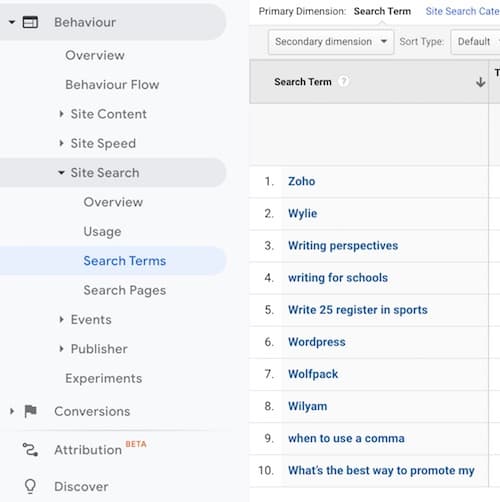
The best advice I ever got about writing was don’t waste time waiting for the muse to arrive. You need to find your writing inspiration much faster than that.
If you are a writer, you write, and good writers know how to get inspired to write.
It doesn’t matter if you write articles, blog posts, poetry, short stories, or novels.
Finding topics or new story ideas is a writing skill and part of the job.
Change your mind
Can you imagine a journalist working for the New York Times telling their editor they’ve got writer’s block?
It would be a great way to lose your job in an instant.
Every writer struggles to find ideas from time to time, but the good ones know how to overcome this problem.
Finding ideas is just a part of the writing process if you love writing. You need to develop skills that suit you and that you can use.
Every writer is different, and there is no one-size-fits-all solution.
It can be challenging for new writers to keep coming up with new ideas. The biggest mistake is often focusing and concentrating too hard, trying to find ideas.
You get frustrated and can end up feeling extremely tired from overthinking.
The best approach is to change your mindset.
Stop thinking and do something completely different.
To give you a kick start, here are eleven of the most successful ways to stop procrastinating and start writing.
1. Go for a walk

It doesn’t matter where you go as long as you get away from your keyboard.
Staring at a white screen will never help you find inspiration for your writing.
Go outside, take the dog for a walk, or move to a different room.
If you’re in an office, go and harass the coffee machine.
Taking a break for 30 minutes or so will help you recharge your batteries.
But look around you. What’s happening?
You’ve got a phone, so why not take photos of anything that attracts your attention?
2. Yeah, listening to music

You’ve probably read this tip before.
But there’s a catch.
Don’t listen to your type of music or your old favorites.
Listen to something new and out of your comfort zone.
I wouldn’t say I like rap. But the lyrics can give you new ideas about what people think and care about.
3. Steal
“Good artists copy; great artists steal.” Pablo Picasso
Whether Picasso said this is open to debate.
British poet T.S. Eliot coined the modern version of this maxim that “Immature poets imitate; mature poets steal.”
However, Steve Jobs started associating Picasso’s name with the expression in the 1980s.
A lot of successful bloggers use this simple technique.
Look at what others are writing about and then find a new angle on the topic.
You might find an article about shoes for summer. Why not take the idea and rework it into sandals for hot weather?
When you just have to write a new blog post, reading other blogs is the quickest way to find inspiration.
Fiction writers, especially romance writers, should head over to the Daily Mail Online website.
There are plenty of juicy celebrity romance headlines and stories every day that will give you a bucketload of plot ideas.
4. Watch people
People-watching is an old-time favorite for a lot of writers.
But don’t concentrate on what they do. Focus more on what you think they are thinking.
Look at their expressions and what you believe might have caused it.
Happy, sad, worried, anxious, or looking pleased are all excellent fodder for a writer. All you need to do is ask yourself why.
She looks like she just got a reminder to pay her tax bill.
He’s off to work, but his face says he has had enough of the grind.
5. Writing prompts
Well, yeah, okay.
If you focus on creative writing, writing prompts can seem far from innovative.
For me, they are so often quite bland and recycled.
Write about a time when you felt sad.
Write about a family member.
But if you must, there are thousands of writing prompts available for you with a quick search.
I prefer more realistic and true to life writing inspiration.
6. Check your junk mail

You probably ignore all your spam and junk emails and trash them.
But it’s a great resource to help with some inspiration for your writing. Copywriters researched and double-researched the subject lines for these emails to attract the most attention.
One that I saw would be great for fiction writers.
Alien DNA used in medical treatments.
For articles and blogs, check what themes these professional email marketers think work and attract clicks.
Watch out for ones that start with everything you need to know about …
They are usually well-investigated and ready for you to exploit.
7. Take the opposite view
You read a lot. So don’t waste your time if you find something you disagree with.
Get moving and write about it from your viewpoint.
I don’t go as far as extending this to politics. But I would certainly have something to say about the Oxford comma or when to use a hyphen or em dash.
Excellent writing is about expressing your point of view.
You can do this in article writing, of course. But it also is an angle to take for fiction writing.
8. Invent a new word
One of my favorite writers was an expert.
Who would ever have thought that a Pangalactic Gargle Blaster would be a classic phrase in literature?
But Douglas Adams did it over and over again.
Okay, his number 42 was popular too.
However, it was more in his inventiveness with words and phrases that he became such a famous author.
Find a new word, and then write about it. The word Gloth kept me going and writing happily for four books.
9. Talk to people

Writers can often tend to be quite insular people. You need quiet and solitude to write.
Forget that! Break out of the mold, find people, and have a conversation.
Every person you meet has a story to tell that you can write about and expand.
Strike up a conversation in a cafe or bar or even at a bus stop or train station.
I had a quick conversation in a dentist’s waiting room a few days ago. The lady was apprehensive, and we discussed breathing techniques and yoga to overcome anxiety.
Writers always write about people, so find more people to write about.
10. Check your blog
You wouldn’t believe the number of writing ideas I get from my blog readers.
The easiest way is to check your blog comments and note what people say, but more importantly, the questions they ask.
It’s a treasure trove of topics for writing.
Another place to look is in Google Analytics. If you have a search field on your blog, you can see what topics your readers have used when searching your site.
Go to the Behavior tab and then Search Terms.

It looks like I’ll have to investigate Wolfpack to find out what that’s about and if it’s a worthy topic.
11. Tired? Give up

Of all my tips, this is the golden rule.
When you’re tired and worn out, it’s time to stop. Give it a break, get some rest, or go to bed.
Nothing is happening, so forcing yourself won’t help at all.
It’s different for every writer.
But for me, the morning is the best time to find new ideas and topics. I usually spend less than half an hour and note anything that tickles my fancy.
Then the rest of the day is for writing.
Summary
You can’t flick a switch and force creativity. As soon as you apply pressure, your creative juices dry up.
When you think about how you came up with some of your best ideas, I’m sure you’ll discover that they seemingly popped out of nowhere.
Of course, they didn’t. But you were relaxed, attentive, and observant enough to grasp a thought when it came along.
There are many other ways apart from those I mentioned to discover a new writing inspiration.
You need only have a small list of mind-changing tactics to use whenever you feel you are struggling with ideas.
When you do that, you will never be short of topics to keep you writing productively.
Related Reading: When To Use The Passive Voice Effectively In Writing
Share This Article



Great tips. I have certainly used a number of them, whether on purpose or accidentally, but they have paid off.
I have written poems (in my head) while stuck in traffic in the rain, and when a total writers block has struck me down, I have started to write about not knowing what to write about, and suddenly my muse has kicked in and the words start to flow.